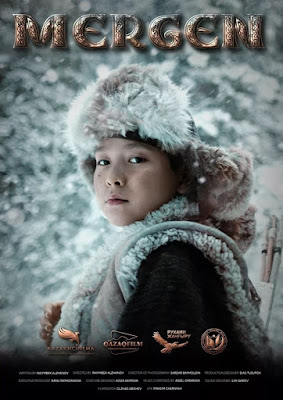
The Academy rules for what constitutes a foreign language film are sometimes controversial, but a film from Kazakhstan, by a Russian director, about Mongolia’s national hero, evidently qualified. That film,
Mongol, the surprise best foreign language nominee, opens today in New York
(trailer here).
If screening
Mongol without the opening credits, one could easily be convinced it was a new subtitled blood-and-guts historical from Mel Gibson. Despite its exotic lineage, it has the elements of a traditional epic. The young Temudgin loses his father, but swears vengeance against his killer. He develops a Kane and Abel relationship with his childhood blood brother and future rival. Though often separated from his wife by the machinations of his enemies, he always finds her again, often pregnant with another dead husband lying at her feet. Characters from his past continually re-emerge to foretell his eventually greatness. Of course, they are not wrong, as Temudgin would eventually be known as Chinggis (or Genghis) Khan. Director Sergei Bodrov’s
Mongol chronicles his early life, filling in some historical gaps with its own fictional speculation.
During the Soviet occupation, the Communists vilified the Mongolian hero, fearing his power as unifying symbol. (In 1962, they briefly flip-flopped on their anti-Khan propanganda, trying co-opt his national prestige.) Oddly, many in the west adopted Soviet characterizations of Chinggis Khan as a blood-thirsty savage, but his rule has been credited by scholars as the first anywhere to establish religious tolerance, women’s rights, the abolition torture, and lower tax rates for doctors, clergy, and teachers. To the pride of Mongolians, Khan was dubbed the “Man of the Millennium” by the
Washington Post.
Some of the best scenes of
Mongol show the seeds of Khan’s grand vision for a modern Mongolia in early germination. However, the film is really about sweeping historical drama, with many of scenes of armies clashing on the wind-swept steppe. There is plenty of hack-and-slash in
Mongol, but action fans might feel cheated when the film’s mysticism trumps battle carnage.
Most of the Mongols in
Mongol are played by Mongolians, but Japanese actor Tadanobu Asano plays Temudgin and Chinese actor Honglei Sun plays his one-time friend, Jamukha, with villainous relish. Probably the best performance comes from first-time Mongolian actor Khulan Chuluun as Temudgin’s resilient first wife and true love Borte. In many respects,
Mongol is an old fashion epic love story, but it is a film Hollywood could not make these days because they do not have any young actors manly enough to play Temudgin.
Bodro

v’s previous work includes co-scripting
East/West, a critical examination of the Stalinist era. In a way, making
Mongol can be seen as a further rejection of the Communist propaganda Bodrov grew up under. Granted, the constant parade of sufferings to be born gets exhausting, but the Twelfth Century was pretty much one darned thing after another. While sometimes the mysticism is laid on a little heavy, Bodrov keeps the action moving along at a good clip, showing a particular talent for grit and gore. It opens today in New York at the Landmark Sunshine.

















